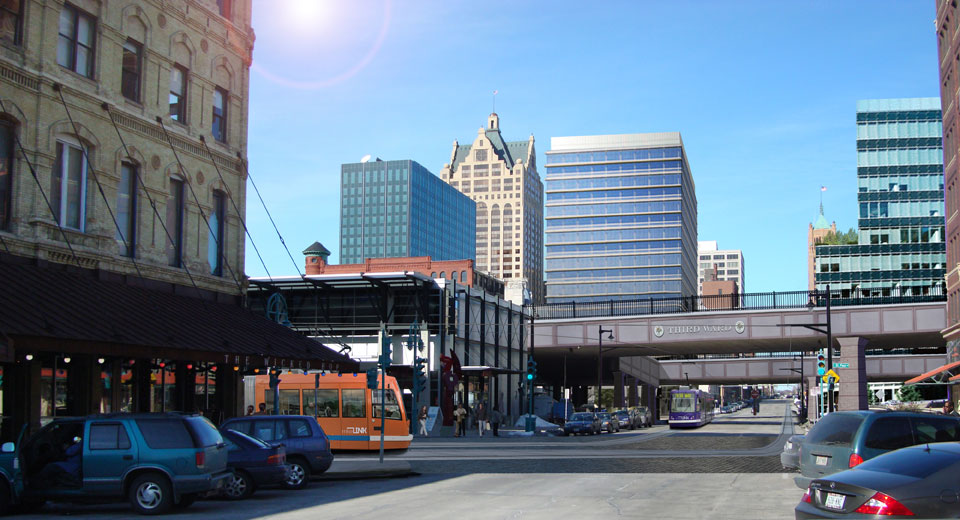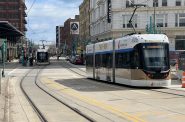A Streetcar Named Cooperation?
Republicans force city to pay to relocate utilities for streetcar and Barrett calls for cooperation from We Energies to keep costs down.

The streetcar as it meets Broadway in the Third Ward. On Tuesday, we learned that the utility relocation costs put by We Energies and AT&T had been vastly overstated. The cost had purportedly ranged as high as $70 million, but current estimates put the figure much lower.
Last week had lots of news related to Milwaukee’s planned streetcar system. On Wednesday, the state Public Service Commission ruled that the city must pay all the costs of utility relocation for the streetcar project, which was a blow to the city. But by then it was already becoming clear the costs of relocation were dropping significantly, which was good news.
The Public Service Commission ruling had been expected after a series of Republican-led legal maneuvers over the past two years. In September 2012 the PSC appeared close to ruling for a compromise that would have capped costs for the utilities for any relocation at $10 million. During the meeting Commissioner Eric Callisto stated, “We have two votes for a police power exercise,” meaning the city was correct in arguing the utilities must pay at least a portion of the relocation costs. But after a curious break in the meeting the commissioners voted to hold off on taking the vote. Commission Chairman Phil Montgomery explained that this was simply to allow Commissioner Ellen Nowak “one more kick at the cat.” As it turned out, it allowed time for the state legislature to take another kick at the cat, the animal in question being Milwaukee. Because in May 2013, Rep. Dale Kooyenga (R-Brookfield) passed a budget motion that changed long-established precedent for such projects and pushed the costs of utility relocation onto the city. Once this occurred the ruling by the PSC became inevitable, if a year in coming.
That would have been a huge blow, had the original estimated cost of $55 to $70 million for utilities relocation been accurate, but city officials have been working for some time to lower the costs. By Tuesday, on the day before the PSC ruling, as a story by reporter Sean Ryan of the Business Journal made clear, the cost had dropped to as low as $20 million and could turn out even lower than this. Ryan quoted Ghassan Korban, Milwaukee Department of Public Works commissioner: “The $20 million estimate is not definite, he said, and will change as Milwaukee continues to coordinate with utility companies to minimize relocations.”
As part of the city’s effort to reduce the cost to the utilities, in January 2014 the city received approval from the Federal Transit Administration to move a section of the track from N. Broadway to N. Milwaukee St. Ryan reported that according the city Engineer Jeff Polenske, “The change eliminates $10 million in construction costs to move underground AT&T communication lines, and avoids moving 2,000 feet of steam tunnels and 2,000 feet of electrical ducts.”
The Journal Sentinel Editorial Board also weighed in on Thursday with a opinion titled, “City should appeal PSC on streetcar costs.” The editorial noted that, “The city has worked hard to adjust the route and negotiate with utilities to bring down the price of moving utility lines. An original estimate of around $55 million for relocation costs is now at $20 million, and that’s before the final engineering stage of the project has been done.”
It appears the JS will get their wish as the city attorney’s office issued a release indicating it would recommend an appeal, but will Barrett get his wish for better cooperation on the part of We Energies and the other utilities? We’ll see.
More about the Milwaukee Streetcar
For more project details, including the project timeline, financing, route and possible extensions, see our extensive past coverage.
- FTA Tells Milwaukee to Crack Down on Fare Evasion — Even Where Fares Don’t Exist - Graham Kilmer - Dec 12th, 2025
- Alderman, State Allies Seek Federal Help to Kill the Streetcar - Jeramey Jannene - Oct 28th, 2025
- Streetcar Service Suspended Following Truck Crash - Jeramey Jannene - Oct 21st, 2025
- One Alderman’s Quest To Defund The Streetcar - Jeramey Jannene - Oct 18th, 2025
- Another Streetcar Collision - Jeramey Jannene - Jun 27th, 2025
- Streetcar Hit By Apparent Red Light Runner - Jeramey Jannene - Jun 16th, 2025
- Streetcar Will Run On Consolidated Route During Summerfest - Jeramey Jannene - Jun 11th, 2025
- City Hall: Milwaukee Must Replace Failing Streetcar Switches - Jeramey Jannene - Feb 24th, 2025
- Streetcar Confronts Limited Funding, Operations Challenges - Evan Casey - Jan 22nd, 2025
- Council Kills Streetcar’s ‘Festivals Line’ - Jeramey Jannene - Jul 31st, 2024
Read more about Milwaukee Streetcar here
Political Contributions Tracker
Displaying political contributions between people mentioned in this story. Learn more.
- December 31, 2020 - Tom Barrett received $500 from Jeff Polenske
- December 2, 2018 - Tom Barrett received $400 from Jeff Polenske
- June 25, 2018 - Tom Barrett received $100 from Ghassan Korban
- May 25, 2017 - Tom Barrett received $400 from Jeff Polenske
- February 1, 2016 - Tom Barrett received $400 from Jeff Polenske
- January 31, 2016 - Tom Barrett received $400 from Ghassan Korban
Back in the News
-
Justice Ziegler Misquotes US Supreme Court Decision
 Dec 2nd, 2025 by Bruce Murphy
Dec 2nd, 2025 by Bruce Murphy
-
Will West Milwaukee Do Development Near Brewers Stadium?
 Dec 1st, 2025 by Bruce Murphy
Dec 1st, 2025 by Bruce Murphy
-
Key Streetcar Opponent Opposes Effort to Shut It Down
 Nov 10th, 2025 by Bruce Murphy
Nov 10th, 2025 by Bruce Murphy





















Whether one likes mass transit or not, it seems to me what needs to be considered is who gets to make decisions about local transportation issues, the state or the local governmental body? In Whitefish Bay, when they redo sewers or streets does this mean we need “kowtow” to the whims of those in Madison rather then our own needs? The real tragedy of this is that we have a “cabal” of folks who for ideological reasons want to control how a city and most definitely THE one real city in Wisconsin improves its transportation infrastructure. I am not sure if any of the funding is from the state but I think not. Using the logic of this, I could sue and/or ask that my utility rate dollars not be used to support the Zoo interchange improvements. What’s missing here is the understanding that we are interconnected communities and our tax and utility rate payments support each other.
I am by no means an expert on utility regulations with the WPSC. Utilities have an easement on public land owned by the taxpayers for laying out their equipment that serves the public. In many cases like in DOT bridge replacement, the utility may be held responsible for movement to conform to new designs since in essence they borrow the land and space. But it all depends. On private development, the landowner may be held responsible for the cost of changes. And in some cases cost is shared by all utility customers. The PSC has rules that all utility customers have to be treated fairly across customer classes and this case and old easement contracts should be visited for language regarding the utility easements. In the case of steam easements, these may go back to the 1800s unless they have been rewritten since that time.
It often appears that Republican legislators in Wisconsin will do anything possible to interfere, obstruct, distort, and make things more difficult in local affairs. And they claim to be the party of expanded freedoms? I assume that means their perverted meaning of freedoms and only if it fits within their narrow uneducated view as directed by Koch Brothers, corporate written ALEC laws by Wal-Mart attorneys and mining interest benefactors.
I’m waiting for Bob Dohnal to say “Choo choo train”……wait for it…..
It’s a simple solution: If WeEnergies refuses to cooperate, the city goes gangbusters on tax credits on solar and wind power in order to take every new development off the grid and to take whole neighborhoods off the grid.
Off the gird is not an option since there is a dependent relationship of having access to electric energy 24 hours a day. Community development of solar systems and ownership by a municipality and the citizens that live here would be a great option to have. Solar electric is reaching a parity cost in what the utility can provide and what a demand side customer can purchase and install on their own. This does cut into utility profits, and really scares them since it may mean a downsizing of their production assets in the long term. No business likes to downsize.
Solar panel production may exceed 10% returns annually, far better than most Wall Street investments.
We need to maximize the effort for efficient public transportation systems since energy costs will rise over time and many people are priced out of car ownership.
While it does pop into one’s head quite quickly, be careful about direct comparisons between WE Energies downtown utility infrastructure and that surrounding the Zoo interchange. A good portion of what you see out by the Zoo is on property that was once the interurban railway (TMER&L), so they own the land. However, the interchanges design is likely what is requiring the new taller monopoles. In short, it is complicated and there’s more than meets the eye.
ATC owns the transmission system. We Energies likely owns the land and it does go back to the interurban rail system. ATC also has a WPSC approved transmission upgrade project in this area that we all pay for in the rate structure. The transmission inter-change work may be part of the project that we all pay for in rates.
Downtown underground high voltage systems are owned by ATC. Underground distribution system are owned by We Energies. We Energies owns about 1/2 of ATC.
All I want to know is why these renderings have large structures that don’t even exist nor are planned to exist. The glass building on the left is a parking lot, same with the one of the right side of Broadway. Could they not sell the streetcar based on how the city actually looks?
@Ryan Those are just showing possible transit-oriented development sites along the route.
Whether you are a supporter of the streetcar or not… does it not concern anyone else that only after realizing they may have to pay for it themselves did the city find a way to bring costs down from $70 million to $20 million? Are the planners for this system that loose with the budget when they think someone else may pay for it? It wouldn’t surprise me, because generally government spending falls along those lines.
Full disclosure, I support the streetcar. However, I do not feel it breaks that barrier in my mind as a regional asset like light rail or a return of an interurban line would have been. Thus, I do not think anyone outside of Milwaukee should be responsible for the costs unless it’s in the form of Federal or state grants for mass transit. Despite what some may think, that is not actually contradictory, since those grants are designed to funnel funds specifically for this purpose and have specific guidelines and criteria that must be met which helps control the spending.
@Andy No. The city has consistently stated that the utility estimates of $55 to $70 million, were not correct. Those numbers were provided prior to significant engineering by the utilities, not the city. Further, the city acted prior to the PSC ruling (and this had been in the works from early on, in response to AT&Ts concerns) to move part of the line to Broadway.
Good to know, thanks Dave. Hadn’t been following it that closely lately.